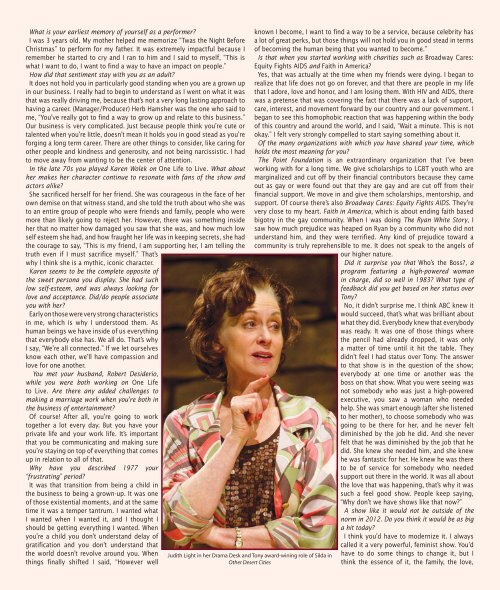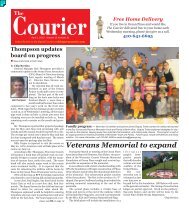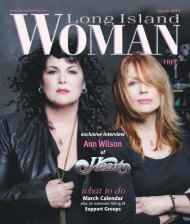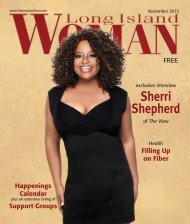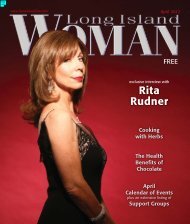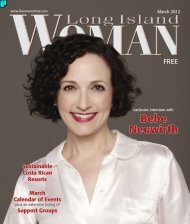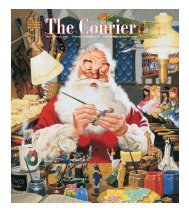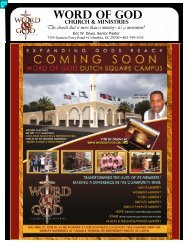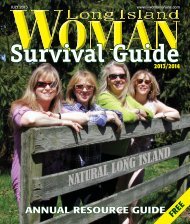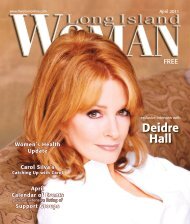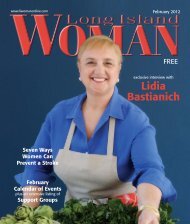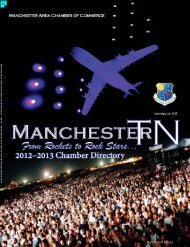Judith Light
Judith Light
Judith Light
Create successful ePaper yourself
Turn your PDF publications into a flip-book with our unique Google optimized e-Paper software.
What is your earliest memory of yourself as a performer<br />
I was 3 years old. My mother helped me memorize “Twas the Night Before<br />
Christmas” to perform for my father. It was extremely impactful because I<br />
remember he started to cry and I ran to him and I said to myself, “This is<br />
what I want to do, I want to find a way to have an impact on people.”<br />
How did that sentiment stay with you as an adult<br />
It does not hold you in particularly good standing when you are a grown up<br />
in our business. I really had to begin to understand as I went on what it was<br />
that was really driving me, because that’s not a very long lasting approach to<br />
having a career. (Manager/Producer) Herb Hamsher was the one who said to<br />
me, “You’ve really got to find a way to grow up and relate to this business.”<br />
Our business is very complicated. Just because people think you’re cute or<br />
talented when you’re little, doesn’t mean it holds you in good stead as you’re<br />
forging a long term career. There are other things to consider, like caring for<br />
other people and kindness and generosity, and not being narcissistic. I had<br />
to move away from wanting to be the center of attention.<br />
In the late 70s you played Karen Wolek on One Life to Live. What about<br />
her makes her character continue to resonate with fans of the show and<br />
actors alike<br />
She sacrificed herself for her friend. She was courageous in the face of her<br />
own demise on that witness stand, and she told the truth about who she was<br />
to an entire group of people who were friends and family, people who were<br />
more than likely going to reject her. However, there was something inside<br />
her that no matter how damaged you saw that she was, and how much low<br />
self esteem she had, and how fraught her life was in keeping secrets, she had<br />
the courage to say, “This is my friend, I am supporting her, I am telling the<br />
truth even if I must sacrifice myself.” That’s<br />
why I think she is a mythic, iconic character.<br />
Karen seems to be the complete opposite of<br />
the sweet persona you display. She had such<br />
low self-esteem, and was always looking for<br />
love and acceptance. Did/do people associate<br />
you with her<br />
Early on those were very strong characteristics<br />
in me, which is why I understood them. As<br />
human beings we have inside of us everything<br />
that everybody else has. We all do. That’s why<br />
I say, “We’re all connected.” If we let ourselves<br />
know each other, we’ll have compassion and<br />
love for one another.<br />
You met your husband, Robert Desiderio,<br />
while you were both working on One Life<br />
to Live. Are there any added challenges to<br />
making a marriage work when you’re both in<br />
the business of entertainment<br />
Of course! After all, you’re going to work<br />
together a lot every day. But you have your<br />
private life and your work life. It’s important<br />
that you be communicating and making sure<br />
you’re staying on top of everything that comes<br />
up in relation to all of that.<br />
Why have you described 1977 your<br />
“frustrating” period<br />
It was that transition from being a child in<br />
the business to being a grown-up. It was one<br />
of those existential moments, and at the same<br />
time it was a temper tantrum. I wanted what<br />
I wanted when I wanted it, and I thought I<br />
should be getting everything I wanted. When<br />
you’re a child you don’t understand delay of<br />
gratification and you don’t understand that<br />
the world doesn’t revolve around you. When<br />
things finally shifted I said, “However well<br />
<strong>Judith</strong> <strong>Light</strong> in her Drama Desk and Tony award-wining role of Silda in<br />
Other Desert Cities<br />
known I become, I want to find a way to be a service, because celebrity has<br />
a lot of great perks, but those things will not hold you in good stead in terms<br />
of becoming the human being that you wanted to become.”<br />
Is that when you started working with charities such as Broadway Cares:<br />
Equity Fights AIDS and Faith in America<br />
Yes, that was actually at the time when my friends were dying. I began to<br />
realize that life does not go on forever, and that there are people in my life<br />
that I adore, love and honor, and I am losing them. With HIV and AIDS, there<br />
was a pretense that was covering the fact that there was a lack of support,<br />
care, interest, and movement forward by our country and our government. I<br />
began to see this homophobic reaction that was happening within the body<br />
of this country and around the world, and I said, “Wait a minute. This is not<br />
okay.” I felt very strongly compelled to start saying something about it.<br />
Of the many organizations with which you have shared your time, which<br />
holds the most meaning for you<br />
The Point Foundation is an extraordinary organization that I’ve been<br />
working with for a long time. We give scholarships to LGBT youth who are<br />
marginalized and cut off by their financial contributors because they came<br />
out as gay or were found out that they are gay and are cut off from their<br />
financial support. We move in and give them scholarships, mentorship, and<br />
support. Of course there’s also Broadway Cares: Equity Fights AIDS. They’re<br />
very close to my heart. Faith in America, which is about ending faith based<br />
bigotry in the gay community. When I was doing The Ryan White Story, I<br />
saw how much prejudice was heaped on Ryan by a community who did not<br />
understand him, and they were terrified. Any kind of prejudice toward a<br />
community is truly reprehensible to me. It does not speak to the angels of<br />
our higher nature.<br />
Did it surprise you that Who’s the Boss, a<br />
program featuring a high-powered woman<br />
in charge, did so well in 1983 What type of<br />
feedback did you get based on her status over<br />
Tony<br />
No, it didn’t surprise me. I think ABC knew it<br />
would succeed, that’s what was brilliant about<br />
what they did. Everybody knew that everybody<br />
was ready. It was one of those things where<br />
the pencil had already dropped, it was only<br />
a matter of time until it hit the table. They<br />
didn’t feel I had status over Tony. The answer<br />
to that show is in the question of the show;<br />
everybody at one time or another was the<br />
boss on that show. What you were seeing was<br />
not somebody who was just a high-powered<br />
executive, you saw a woman who needed<br />
help. She was smart enough (after she listened<br />
to her mother), to choose somebody who was<br />
going to be there for her, and he never felt<br />
diminished by the job he did. And she never<br />
felt that he was diminished by the job that he<br />
did. She knew she needed him, and she knew<br />
he was fantastic for her. He knew he was there<br />
to be of service for somebody who needed<br />
support out there in the world. It was all about<br />
the love that was happening, that’s why it was<br />
such a feel good show. People keep saying,<br />
“Why don’t we have shows like that now”<br />
A show like it would not be outside of the<br />
norm in 2012. Do you think it would be as big<br />
a hit today<br />
I think you’d have to modernize it. I always<br />
called it a very powerful, feminist show. You’d<br />
have to do some things to change it, but I<br />
think the essence of it, the family, the love,


